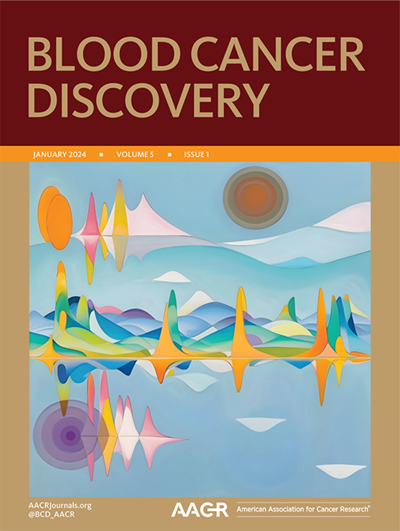Brexucabtagene Autoleucel versus Allogeneic Hematopoietic Cell Transplantation in Relapsed and Refractory Mantle Cell Lymphoma.
IF 11.5
Q1 HEMATOLOGY
引用次数: 0
Abstract
Significance: Patients aged ≥50 years with r/r MCL had superior OS and lower nonrelapse mortality 1 year after receiving brexu-cel compared with alloHCT. However, the long-term PFS and OS are similar for both treatments. Individual risk-benefit evaluation is essential to guide optimal treatment decisions.
Brexucabtagene自体甲醇与异基因造血细胞移植治疗复发难治性套细胞淋巴瘤。
Brexucabtagene自体造血细胞(brexu- cell)和同种异体造血细胞移植(allogenic hematopoietic cell transplantation, alloHCT)是治疗复发或难治性套细胞淋巴瘤(r/r MCL)的有效方法,但最佳选择仍不清楚。我们在ZUMA-2研究中对64名年龄≥50岁的接受brexue - cell治疗的r/r MCL患者进行了分析,根据倾向评分将他们与64名(272名中的64名)接受同种异体hct的r/r MCL患者进行了1:1的匹配,数据来自EBMT登记处。brexus - cell和匹配同种异体ct队列的中位随访时间分别为36.5个月和34.1个月。brexus - cell患者在治疗后1年的总生存率(OS, 81.3% vs 59.2%, HR: 0.39, p=0.004)和非复发死亡率(3.6% vs 21.2%, p=0.015)显著提高。慢性移植物抗宿主病发生在26.9%的同种异体hct患者在第一年。然而,长期无进展生存期和OS仍然具有可比性。尽管这项非随机研究存在局限性,但它表明brexucell在r/r MCL中具有优越的安全性。
本文章由计算机程序翻译,如有差异,请以英文原文为准。
求助全文
约1分钟内获得全文
求助全文
来源期刊

Blood Cancer Discovery
Multiple-
CiteScore
12.70
自引率
1.80%
发文量
139
期刊介绍:
The journal Blood Cancer Discovery publishes high-quality Research Articles and Briefs that focus on major advances in basic, translational, and clinical research of leukemia, lymphoma, myeloma, and associated diseases. The topics covered include molecular and cellular features of pathogenesis, therapy response and relapse, transcriptional circuits, stem cells, differentiation, microenvironment, metabolism, immunity, mutagenesis, and clonal evolution. These subjects are investigated in both animal disease models and high-dimensional clinical data landscapes.
The journal also welcomes submissions on new pharmacological, biological, and living cell therapies, as well as new diagnostic tools. They are interested in prognostic, diagnostic, and pharmacodynamic biomarkers, and computational and machine learning approaches to personalized medicine. The scope of submissions ranges from preclinical proof of concept to clinical trials and real-world evidence.
Blood Cancer Discovery serves as a forum for diverse ideas that shape future research directions in hematooncology. In addition to Research Articles and Briefs, the journal also publishes Reviews, Perspectives, and Commentaries on topics of broad interest in the field.
 求助内容:
求助内容: 应助结果提醒方式:
应助结果提醒方式:


